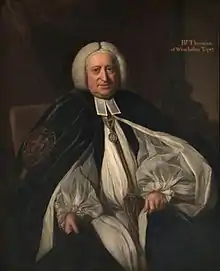John Thomas | |
|---|---|
| Bishop of Winchester | |
 1761 portrait by Nathaniel Dance-Holland | |
| Diocese | Diocese of Winchester |
| In office | 1761–1781 (d.) |
| Predecessor | Benjamin Hoadly |
| Successor | Brownlow North |
| Other post(s) |
|
| Orders | |
| Consecration | 4 October 1747 |
| Personal details | |
| Born | 17 August 1696 |
| Died | 1 May 1781 (aged 84) Winchester House, Chelsea, Middlesex, Great Britain |
| Nationality | English |
| Denomination | Anglican |
| Alma mater | Keble College, Oxford |
John Thomas (17 August 1696 – 1 May 1781) was an English bishop.
He was educated at Charterhouse School and Christ Church, Oxford, where he graduated M.A. in 1719 and became Fellow of All Souls College, Oxford in 1720.[1]
He became Bishop of Peterborough in 1747, and was made preceptor to the future George III, then Prince of Wales, in 1752. In 1757 he became Bishop of Salisbury, and in 1761 Bishop of Winchester.[1]
Life
He was the son of Stremer Thomas, a colonel in the Guards Regiment, born on 17 August 1696 at Westminster, and educated at Charterhouse school. He matriculated from Christ Church, Oxford, on 28 March 1713, and took the degrees of B.A. 1716, M.A. 1719, B.D. 1727, and D.D. 1731. In 1720 he was elected fellow of All Souls' College, and, having been disappointed of a living promised to him by a friend of his father, took a curacy in London. Here his preaching attracted attention; in 1731 he was given a prebend in St Paul's Cathedral, and was presented by the dean and chapter in 1733 to the rectory of St. Bene't and St. Peter, Paul's Wharf, which he retained till 1757.[1]
In 1742 Thomas succeeded to a canonry of St Paul's, and held it till 1748. In 1742 he had been made one of George II's chaplains, and preached the Boyle lectures, which he did not publish; and, having secured the favour of the king when Prince of Wales, he was given the bishopric of Peterborough, and consecrated a bishop at Lambeth Palace on 4 October 1747.[1] He had been elected to that See on 12 September, confirmed 3 October, and was enthroned by proxy on 24 October 1747.[2]
In 1752 Thomas was selected to succeed Thomas Hayter as preceptor to the young Prince of Wales, later George III, James Waldegrave, 2nd Earl Waldegrave being governor; these appointments were directed against the influence of the Dowager Princess of Wales. In 1757 he followed John Gilbert as Bishop of Salisbury (and ex officio Chancellor of the Order of the Garter) and also as clerk of the closet; and in 1761 was translated to Winchester in succession to Benjamin Hoadly.[1] He was elected to the See of Salisbury on 3 June, confirmed 18 June, and enthroned (by proxy) on 4 July 1757;[3] and elected to the See of Winchester on 4 May, confirmed 23 May, and enthroned (by proxy) on 6 June 1761.[4]

Thomas died at Winchester Palace, on 1 May 1781, and was buried in Winchester Cathedral. There are portraits of the bishop at the palaces of Salisbury and Lambeth, and a fine mezzotint engraving (three-quarter length in robes of the Garter) by R. Sayer from a picture by Benjamin Wilson, published on 24 January 1771.[1]
Works
John Thomas published about ten works, mainly sermons.[1]
Family
Thomas married Susan, daughter of Thomas Mulso of Twywell, Northamptonshire; her brother Thomas married the bishop's sister, and their daughter, Mrs. Hester Chapone, spent much of her time after her husband's death with her uncle and aunt at Farnham Castle. Mrs. Thomas died on 19 November 1778, leaving three daughters:[1]
- Susanna Thomas, married Newton Ogle, Dean of Winchester;
- Anne Thomas, married William Buller, Bishop of Exeter;
- Hester Thomas, married Rear Admiral Sir Chaloner Ogle, 1st Baronet.
References
- 1 2 3 4 5 6 7 8 . Dictionary of National Biography. London: Smith, Elder & Co. 1885–1900.
- ↑ Fasti Ecclesiae Anglicanae 1541–1857, vol. 8, 1996, pp. 115–118
- ↑ Fasti Ecclesiae Anglicanae 1541–1857, vol. 6, 1986, pp. 1–5
- ↑ Fasti Ecclesiae Anglicanae 1541–1857, vol. 3, 1974, pp. 80–83
Attribution
![]() This article incorporates text from a publication now in the public domain: "Thomas, John (1696-1781)". Dictionary of National Biography. London: Smith, Elder & Co. 1885–1900.
This article incorporates text from a publication now in the public domain: "Thomas, John (1696-1781)". Dictionary of National Biography. London: Smith, Elder & Co. 1885–1900.

